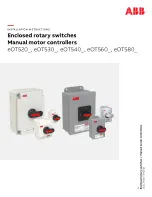
Non Contact Coded Safety Switches
MAINTENANCE:
Monthly: Check alignment of actuator and look for signs of mechanical damage to the switch casing. Check wiring for signs of damage.
Check each switch function by opening and closing each guard individually in turn and ensuring that the Green LED on the switch and the appropriate LED’s on the Safety Relay are
illuminated when the switch is closed and are extinguished when the switch is open. Check that the machine stops and cannot be re-started when each switch is open.
Never repair any switch, actuator or integral cables. Replace any switch displaying signs of mechanical damage to the casing or cables.
IMPORTANT NOTE:
Read and understand these instructions before installing, operating, or maintaining this equipment.
The product is designed to be a component of a customised safety orientated control system. It is the responsibility of each manufacturer to ensure the correct overall functionality of its
systems and machines. IDEM, its subsidiaries and affiliates, are not in a position to guarantee all of the characteristics of a given system or product not designed by IDEM.
APPLICATION:
Coded Non Contact switches are designed to interlock hinged, sliding or removal guard doors. They are specifically advantageous when:
a)
poor guard alignment exists
b)
anti-tamper is required
c)
high hygiene requirements exist e.g. food industry hose down
d)
a long mechanical life is required (no moving or touching parts).
When used in combination with a Dual Channel Safety Relay, Coded Non Contact Switches can be used to provide protection up to Category 4 and Ple to ISO13849-1.
OPERATION:
All Coded Non Contact Safety Switches are designed to conform to IEC 60947-5-3 and be used as directed by EN1088, EN ISO12100 and EN 60204-1. They have coded magnetic
sensing which provides a wide (>10mm) sensing distance and provides a high tolerance to misalignment after sensing. They can be fitted behind stainless steel fittings and can operate in
extreme environments of temperature and moisture.
INSTALLATION:
Installation of all Coded Non Contact Switches must be in accordance with a risk assessment for the individual application.
The use of a Safety Relay is required for monitoring Coded switches. These relays monitor 2 redundant circuits as per ISO13849-1 for up to Ple / Category 4 protection.
Coded Non Contact switches are designed to operate with most Dual Channel Safety Relays to satisfy IEC 60947-5-3 PDF-S.
M4 mounting bolts must be used to fix the switches. (Except RPC and RMC types.) RPC and RMC types require fitting through 30.5mm clearance holes. The lock nuts supplied must be
used to secure the switches. Tightening torque for mounting bolts to ensure reliable fixing is 1.0 Nm. Always mount on to Non Ferrous materials. The recommended setting gap is 5mm.
The Safety switch must not be used as a mechanical stop or be adjusted by striking with a hammer. The actuator must not be allowed to strike the switch. Do not mount adjacent switches
or actuators closer than 30mm.
Typical misalignment tolerance after setting is 5mm.
After installation always check each switch function by opening and closing each guard individually in turn and ensuring that the Green LED on the switch and the LED’s on the Safety
Relay are illuminated when the switch is closed and are extinguished when the switch is open. Check that the machine stops and cannot be re-started when each switch is open.
For MPC types, fit the protective screw covers after the final checks have been completed.
ACTUATOR OPENING DIRECTIONS:
Align actuator and switch using the target lines.
MPC MMC SPC SMC WPC WMC LPC LMC
CPC CMC
Misalignment range
Operating Instructions
MPC
(PLASTIC)
LPC
(PLASTIC)
LMC
(METAL)
WPC
(PLASTIC)
WMC
(METAL)
SPC
(PLASTIC)
SMC
(METAL)
CPC
(PLASTIC)
CMC
(METAL)
RPC
(PLASTIC)
RMC
(METAL)
RPC RMC
MMC
(METAL)




















